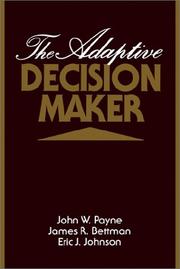| Listing 1 - 10 of 17 | << page >> |
Sort by
|

ISBN: 0470990074 Year: 1976 Publisher: Hillsdale Erlbaum
Abstract | Keywords | Export | Availability | Bookmark
 Loading...
Loading...Choose an application
- Reference Manager
- EndNote
- RefWorks (Direct export to RefWorks)
Cognitive psychology --- Social psychology --- Cognition --- Congresses --- 159.95*1 --- 159.923.33 --- -Social psychology --- -Mass psychology --- Psychology, Social --- Human ecology --- Psychology --- Social groups --- Sociology --- Cognitieve psychologie --- Sociale invloeden op het karakter. Sociale psychologie--(invloed van de omgeving op het individu;z.o.{316.6}) --- Congresses. --- -Cognitieve psychologie --- 159.923.33 Sociale invloeden op het karakter. Sociale psychologie--(invloed van de omgeving op het individu;z.o.{316.6}) --- 159.95*1 Cognitieve psychologie --- -159.95*1 Cognitieve psychologie --- Mass psychology

ISBN: 0521415055 0521425263 1139173936 9780521425261 Year: 1993 Publisher: Cambridge Cambridge University press
Abstract | Keywords | Export | Availability | Bookmark
 Loading...
Loading...Choose an application
- Reference Manager
- EndNote
- RefWorks (Direct export to RefWorks)
The Adaptive Decision Maker argues that people use a variety of strategies to make judgments and choices. The authors introduce a model that shows how decision makers balance effort and accuracy considerations and predicts which strategy a person will use in a given situation. A series of experiments testing the model are presented, and the authors analyse how the model can lead to improved decisions and opportunities for further research.
Adaptability (Psychology) --- Decision making --- Adaptation (Psychologie) --- Prise de décision --- Decision Making --- Prise de décision --- Deciding --- Decision (Psychology) --- Decision analysis --- Decision processes --- Making decisions --- Management --- Management decisions --- Choice (Psychology) --- Problem solving --- Adaptation (Psychology) --- Adaptive behavior --- Flexibility (Psychology) --- Malleability (Psychology) --- Personality --- Adjustment (Psychology) --- Health Sciences --- Psychiatry & Psychology --- Decision making.
Book
Year: 2001 Publisher: Chicago: University of Chicago press,
Abstract | Keywords | Export | Availability | Bookmark
 Loading...
Loading...Choose an application
- Reference Manager
- EndNote
- RefWorks (Direct export to RefWorks)
Book
Year: 1771 Publisher: London: Printed for J. Payne, and sold by J. Johnson,
Abstract | Keywords | Export | Availability | Bookmark
 Loading...
Loading...Choose an application
- Reference Manager
- EndNote
- RefWorks (Direct export to RefWorks)
Book
Year: 2001 Publisher: Chicago (Ill.) University of Chicago Press
Abstract | Keywords | Export | Availability | Bookmark
 Loading...
Loading...Choose an application
- Reference Manager
- EndNote
- RefWorks (Direct export to RefWorks)
Book
Year: 2001 Publisher: Chicago, Ill. University of Chicago Press
Abstract | Keywords | Export | Availability | Bookmark
 Loading...
Loading...Choose an application
- Reference Manager
- EndNote
- RefWorks (Direct export to RefWorks)
Book
Year: 2001 Publisher: S.l. Journal of Consumer Research
Abstract | Keywords | Export | Availability | Bookmark
 Loading...
Loading...Choose an application
- Reference Manager
- EndNote
- RefWorks (Direct export to RefWorks)
Book
Year: 2023 Publisher: Cambridge, Mass. National Bureau of Economic Research
Abstract | Keywords | Export | Availability | Bookmark
 Loading...
Loading...Choose an application
- Reference Manager
- EndNote
- RefWorks (Direct export to RefWorks)
For many Americans the question of when to claim Social Security benefits is one of the most consequential financial decisions they will ever face. While acknowledging that individuals differ in terms of optimal timing for starting Social Security benefits, many economists argue that an average person would benefit from delaying claiming as long as they could. Yet this is not what average Americans do. Many more Americans claim as soon as possible, at age 62, rather than as late as possible, at age 70. Why? This paper focuses on individual differences in beliefs and values that influence Social Security claiming intentions. As expected from economic theory, individual differences in life expectations and degree of patience for later larger payouts relate to claiming intentions. In addition, however, we also find that individual differences in psychological ownership of one's Social Security benefits and individual differences in degree of loss aversion are both significant predictors of Social Security claiming intentions. Further, we find that an "enriched" information display manipulation (nudge) that emphasizes longer-term consequences of late claiming leads to earlier, not later, claiming intentions, and that the size of this effect is related to individual differences in the degree of loss aversion.
Multi
ISBN: 9781139173933 9780521415057 9780521425261 Year: 1993 Publisher: Cambridge Cambridge University Press
Abstract | Keywords | Export | Availability | Bookmark
 Loading...
Loading...Choose an application
- Reference Manager
- EndNote
- RefWorks (Direct export to RefWorks)
Book
Year: 1766 Publisher: London: Printed for A. Millar, and T. Cadell, J. Dodsley, and J. Payne,
Abstract | Keywords | Export | Availability | Bookmark
 Loading...
Loading...Choose an application
- Reference Manager
- EndNote
- RefWorks (Direct export to RefWorks)
| Listing 1 - 10 of 17 | << page >> |
Sort by
|

 Search
Search Feedback
Feedback About UniCat
About UniCat  Help
Help News
News